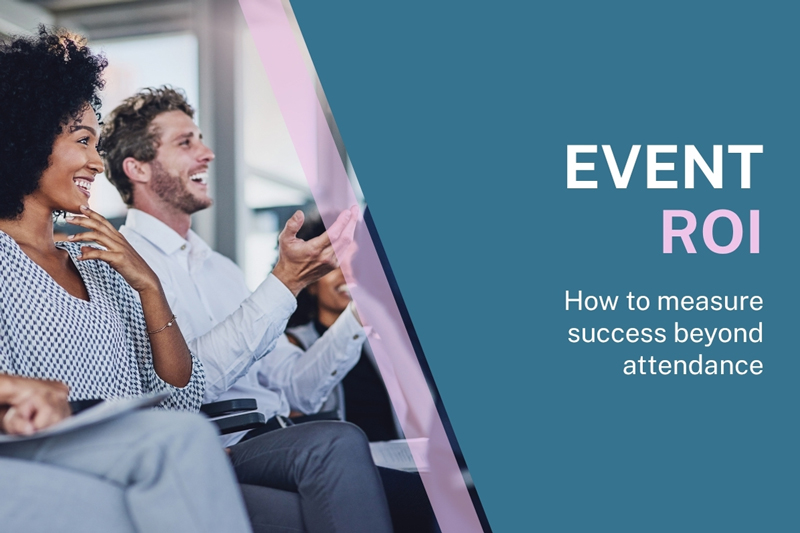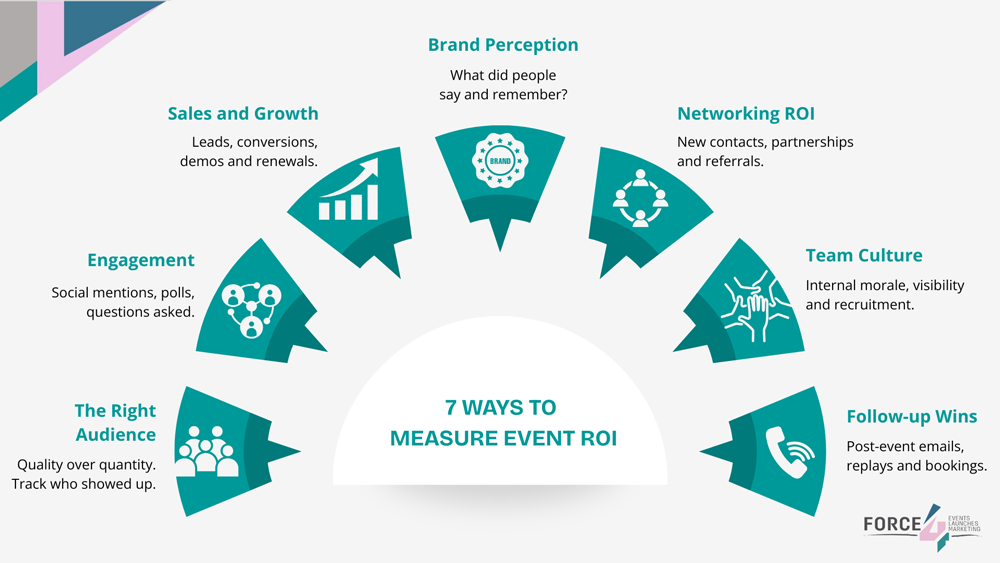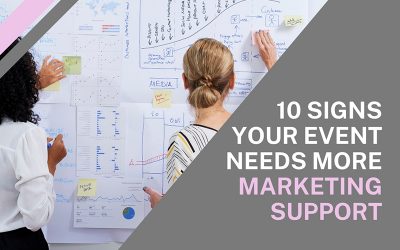It’s Not Just About the Headcount
You filled the room. Great. However did it work?
It’s easy to judge an event’s success by how many people attended. Still numbers alone don’t mean impact.
In reality, real return on investment (ROI) comes from what happens before, during, and after the event. In the conversations sparked, the leads generated, the relationships strengthened, and the ripple effects that follow.
If you’re investing time, budget, and energy into hosting or marketing events, it’s time to go beyond vanity metrics and start measuring what really matters.
According to a study by Eventbrite, 79% of event organisers measure event success by attendance, but fewer than 30% measure financial ROI. This highlights a gap in understanding the actual value of events.
[source: momencia.com]
Take our short quiz at the end of this article to see if your event strategy is set up for real success.
What Does “Event ROI” Actually Mean?
ROI doesn’t just stand for Return on Investment.
For purpose-led businesses, in fact it can also mean:
- Return on Intention: Did your event deliver on your original goals?
- Return on Interaction: Did attendees engage meaningfully with your brand or message?
- Return on Impact: Did the event spark change, drive leads, build community, or move the needle?
When you’re clear on what ROI means to you, you’ll know exactly what to track and how to design your event around that intention.
Ways to measure event ROI that go beyond the numbers
The right audience
It’s not about how many people showed up. It’s about who showed up. Did your ideal clients, partners, or community members attend?
How to measure it:
- Run a short post-event survey with job titles, goals, or organisation type
- Track how many attendees match your target personas
- Identify high-quality leads from sign-ups or interactions
If your messaging speaks to the right people, the room fills with the right energy. As a result, your outcomes are more impactful.
This is where a clear, purpose-aligned event sales page can do some heavy lifting.
Engagement during the event
Whether it’s a virtual webinar or an in-person gathering, engagement is a strong indicator of resonance and relevance.
What to track:
- Social media mentions, shares, or tagged posts
- Questions asked during Q&A sessions
- Poll participation or live chat engagement
- Time spent at key sessions or activations
The most memorable events go beyond content delivery. They connect emotionally and create space for interaction.
If you’re not sure where to start, digging into the psychology of why people remember events can offer powerful guidance.
Leads, sales and strategic growth
If your event was designed with commercial outcomes in mind, there are several revenue-focused metrics you can track:
What to measure:
- Number of qualified leads captured
- Sales conversions linked to the event
- Demo requests or orders places
- Upsells, renewals or long-tail client opportunities
Other business-building opportunities include:
- Live product demos
- Event-exclusive offers or pricing
- New supplier or distribution connections
These aren’t just transactional wins. Rather they are part of your long-term business development pipeline.
Brand awareness and perception
Great events don’t just inform. They position. Your event should leave attendees thinking, “Wow, that’s a brand I trust, like, and want to work with.”
How to track it:
- Pre- and post-event brand sentiment surveys
- Growth in social media followers, mentions, or engagement
- Press coverage or thought leadership features
- Feedback from attendees on what they remembered or appreciated most
According to the Event Marketing Institute’s EventTrack research, 74% of consumers said that engaging with branded event marketing experiences made them more likely to buy the promoted products.
Relationship Building and Networking ROI
The conversations that happen in the hallway or over coffee? They’re often more valuable than the keynote.
Whether you’re hosting or attending, business events are a powerful platform for connection. It provides an opportunity for generating leads, and building a network of potential clients, partners and collaborators.
Additionally new partnerships can be forged, and existing ones strengthened by meeting industry peers, potential suppliers and other stakeholders at an event.
What to track:
- Number of new contacts made
- Follow-up meetings booked
- Referrals or co-marketing opportunities that result
Events are fertile ground for connection. Especially when you’ve created the right space and energy for it to happen.
Force 4 Events client story:
Our partnership with Education Boutique brought teachers, parents, case workers and local professionals into structured networking spaces. Both events produced so many leads that the team paused future dates to manage demand — and achieved a stunning 3,000% ROI on the roadshow investment.
Team culture and recruitment
Whether your team is attending or organising, events can energise your people and boost morale. Fostering a stronger, more positive company culture.
Other benefits:
- Organic team-building moments
- Interest from potential recruits
- Social content that highlights your positive team culture
In turn, when your team feels proud to represent your brand, that energy carries far beyond the event. Into their work, their networks and your reputation.
Follow-up is where the real ROI ‘magic’ happens
The event might be over, but your impact shouldn’t end when the lights go out.
At Force 4 Events, we believe the real ROI begins after the event. It’s how you continue the conversation, nurture relationships, and turn momentum into meaningful outcomes.
A powerful follow-up strategy transforms one-off moments into long-term results.
Track:
- Post-event email open and click-through rates
- Replay views or content downloads
- Conversations sparked (DMs, LinkedIn comments, inquiries)
- Bookings, partnerships, or opportunities created in the weeks after
When you follow up with intention and clarity, you give your event the longevity it deserves. And that’s where the magic (and measurable results) really begins.
A note for purpose-driven teams
You don’t have to choose between values and value. Your event can be ethical, intentional, and inclusive and deliver incredible ROI, when you define success clearly and measure it wisely.
Whether you’re a time-strapped marketing manager or a founder planning your first event, measuring beyond attendance gives you the data (and confidence) to make your next event even better.
If you’re only tracking bums on seats, you’re missing the bigger picture.
ROI isn’t a single number; it’s a full story. And ultimately, we’re here to help you tell it.
Are you measuring the right event ROI?
Take this short quiz to see if your event strategy is set up for real success — beyond bums on seats.
Love what you’re reading? Let’s connect on LinkedIn
Need help creating memorable events for business growth?
Whether you’re planning a trade show or a full-scale event, we help you turn it into a high-impact brand experience.
From boosting ticket sales to increasing conversions, we work as an extension of your team—delivering strategy, marketing, and management across the full event cycle. Event marketing packages.
Small Events, Big Results: Rethinking Event ROI in 2026
It’s a Monday morning, the post-event report is due in an hour, and your leadership team is...
10 Signs Your Event Needs More Marketing Support (and how to fix it)
You’ve got the venue booked, the agenda locked, and your speakers confirmed. But if your event...
How Small Events Can Create Big Environmental Impact
You care, but where do you start? For teams running conferences, summits, and community events,...




